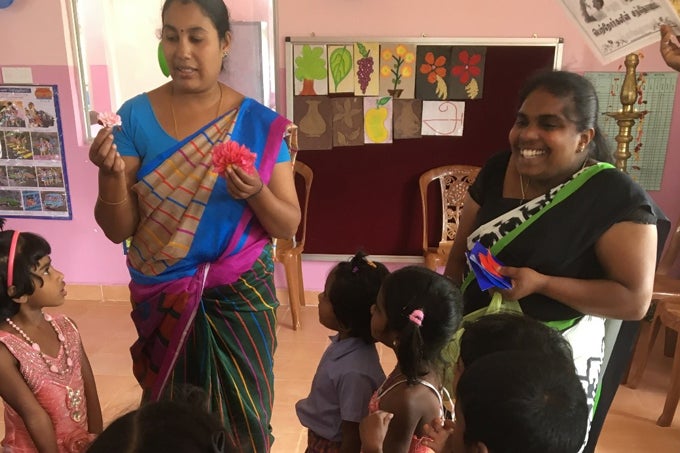
About 4 percent of the Sri Lankan population live in plantations. And while poverty rates have improved significantly in the last decade across Sri Lanka, people living in plantations are still among the poorest in the country . The Mount Vernon Estate, Middle Division, Hatton had an old Child Development Center (CDC) closer to the road with very limited space for the children to move around.
Until recently, the facilities were beyond repair.
That is, until the World Bank-funded Sri Lanka Early Childhood Development Project provided financial assistance to build a spacious new CDC.
The construction work was completed in October 2017 and handed over to the community.
Nearly 20 children now attend the CDC every day.
Kamala Darshani, the Child Development Officer in charge is pleased that the children now have a brand new center with new tables, chairs, and toys. She finds that the children love various colors and feels that the children could benefit from attending the center every day.
S. Rajeswari, the aunt of one of the children indicated that the “new center has many changes. It is airy and there is more room for the children to play. There is electricity and water.”
M. Gauri, the mother of two-year-old Dakshitha said that “it was interesting to find two water-sealed toilets. My son is happy to go to the toilet here.” She added that “the play area outside is fenced. I am glad that Dakshitha is safe and he cannot wander around in the tea bushes.”
The infant room has a separate feeding area and there are two big posters promoting breast milk over powdered milk written in both Tamil and Sinhala.
Kamala received her Child Development Diploma in 2010 and is now waiting to take a refresher course this year.
Yamuna, the Assistant Child Development Officer is currently following the Child Development Diploma offered by the Plantation Human Development Trust (PHDT).
The course has helped her better understand children and develop new activities to stimulate their learning.

The project also sponsors awareness classes, during which parents learn how to help their child achieve their optimal growth and development.
The parents’ committee now includes 12 active members, all of them holding a job, and meet once a week to discuss issues relevant to the center. All parents meet every two months to discuss among other things attendance, nutrition, and special needs.
The parents’ committee is also maintaining funds by collecting Rs. 200/- (about $1.30). The money collected is maintained by a treasurer appointed by the parents and provides meals for the children. Parents also volunteer to prepare meals in the kitchen.
Sri Lanka spends less on early childhood education than the global average.
A World Bank report published in 2014 notes that Sri Lanka’s public spending on education as a percentage of its economy is the lowest in South Asia and its spending on early childhood education (ECE) is significantly lower than the global average.
Around 60 percent of preschools are run by the private sector and 24 percent by other organizations and religious groups.
Income and location are found to be among the key determinants to access ECCE services.
Children from the richest 20 percent of the population are 17 percent more likely to be enrolled in preschools than children from the poorest 20 percent. Enrollment rates in urban areas is 10 percent higher than enrollment in rural or estate areas.
Ways to improve access to early childhood care and education
The Government of Sri Lanka has committed to improving early childhood care and education through the Early Childhood Development Project financed by the World Bank.
The project will run until mid-2021 and, under the leadership of the Ministry of Women and Child Affairs, will support all ECD centers, giving priority to poor, remote and/or underserved areas.
Whether in plantations or in the rest of the country, the needs are immense.
For staff members working at CDC in Mount Vernon Estate, the project has brought the hope of better early childhood care and development opportunities.
They are hopeful too that all children will continue attending the center and enroll in primary school.


Join the Conversation